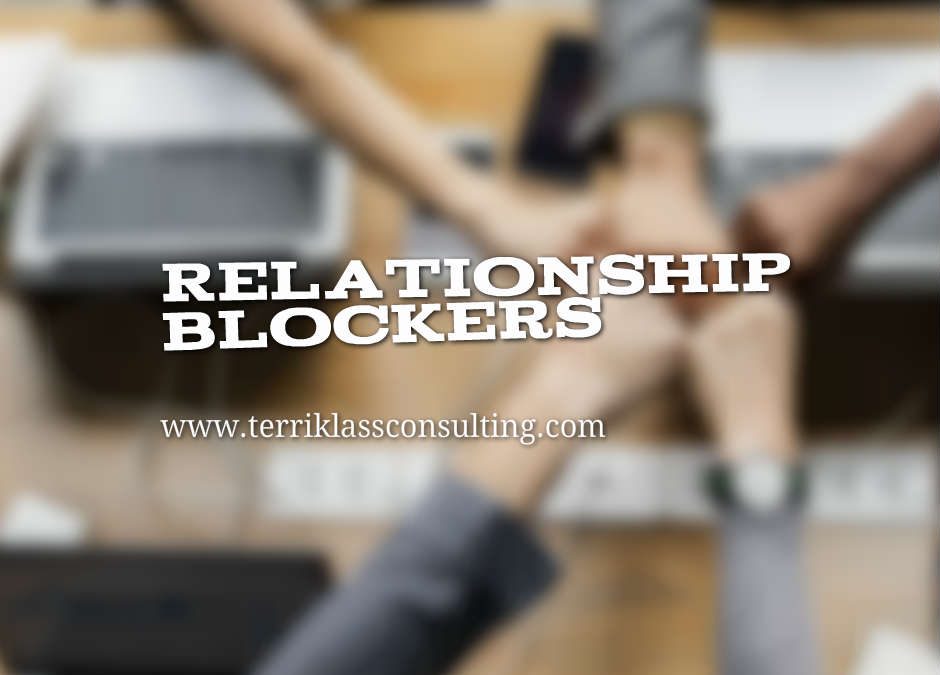It can be so frustrating to be technically competent on a team and yet not be able to cultivate strong relationships with our co-workers or bosses. It’s not that we don’t like the people we work with; it’s more that we find it difficult to share ideas with them. Other team members seem to easily connect over lunch or during meetings but those interactions don’t come naturally to us.
Why do we find it challenging to form relationships with the very people we see each day?
How can we create more meaningful relationships in our work world to feel that we belong?
What is preventing us from connecting with our teammates and bosses?
Five Relationship Blockers For Leaders
1. Unapproachable
We may not even be aware we are doing it, but sometimes we send out the signal that we don’t want others to bother us. We do this by working in a silo on projects, rather than reaching out to others for advice or input. Of course there are some responsibilities we need perform individually. However, we need to make an effort to share our progress and issues we face with our team members. That connection is critical to building relationships. If a team member asks us for ideas to resolve a problem we need to make the time to work with them too.
To build relationships in our workplaces leaders need to be approachable. Share on X2. Unconvincing Communication
Communication is the oil to keep our teams and organizations going. It is also the foundation of meaningful relationships. We owe it to ourselves and to our team members to become as strong a communicator as possible. Impactful communication involves:
- Using clear, open and direct messages.
- Being respectful of the other person’s point of view.
- Listening to really hear what our co-workers and bosses are saying.
- Making sure our body language and face shows we are in the moment.
3. Not Trustworthy
The foundation of any relationship is trust and that begins with learning more about one another- learning what makes each person tick. What brings them joy? What is challenging? Spending time with our colleagues goes a far way to developing rapport and trust. Before a meeting chat a team member up about what they are doing after work. Set up lunches or coffees to get to know what they are all about in and out of work.
4. Low EI
There is no greater block to building a relationship than by not being self-aware of our own emotions and keying into the emotions of others. Emotional intelligence is critical to a leader’s ability to connect with others in a deep way. According to EI guru Daniel Goleman, relationship management is critical for outstanding leadership. Ask yourself these questions. Are you aware when:
- You feel upset or anxious?
- Your co-worker is in need of your support?
- You act inappropriately and say hurtful words?
- You act boastful or braggy?
5. Have A “Go It Alone” Attitude
Ultimately leaders must recognize that they will be more influential if they foster collaboration with team members and colleagues. When we value the individual contributions of others and integrate them into an end result the impact will be far greater than working alone. Synergy of different talents and strengths always pays off in dividends. So dump the attitude that working alone is quicker or more effective.
What additional relationship blockers have you experienced or seen?


Hi Terri,
You have nailed the 5 key relationship blockers .. and they block their leadership and morale as well.
Great post.
Kate
I agree that the same relationship blockers will lead to poor leadership and low morale.
Thanks Kate for your thoughtful comments!
Leaders are busy but that’s not an excuse for running from meeting to meeting and blocking relationships that matter. I worked for a leader who I knew was kind and compassionate because we both worked away from home, we had a chance to get to know each other outside of the office. However, when he was in the office, he had a lot of work to do (who doesn’t?) and he kept his office door shut most of the time. Yes, he had a lot of calls but he also created an environment where people were afraid to knock. Not to mention… what do you think other leaders on the team that reported to him started to do? You guessed it, keep their doors closed for most of the day. It’s common in so many organizations. Your insights here will be helpful to so many.
Alli
That leader you describe is extremely unapproachable and was definitely sending out the message that he was not interested in cultivating meaningful relationships with his team. The result is not surprising. When leaders can’t model the way of the importance of connecting with others they will never be able to build trust. And at the foundation of any team’s success is a workplace that values others and cares about their contributions.
Thanks Alli for sharing your wise insights with us!
This is is such a great list. I would add overly competitive. If you’re so worried about your position in the stack rank that you hold back best practices or are unwilling to sacrifice for the greater good, everyone can spot that a mile away.
I love your addition to the list Karin! Yes it is so obvious when a team member feels threatened and will not share their strongest work with others. I have seen this behavior in many workplaces and what I always say is: When we make valuable contributions to our team both our team and ourselves win. Collaboration is always far greater to a team’s success than competition. Collaboration is essential for relationship building.
Thanks Karin for adding to our dialogue!
Excellent and extraordinary post.
Every point is truth and also valid for Sr. & Jr. Managers.
Zafarmanzoor. Pakistan.
Thanks Zafar!